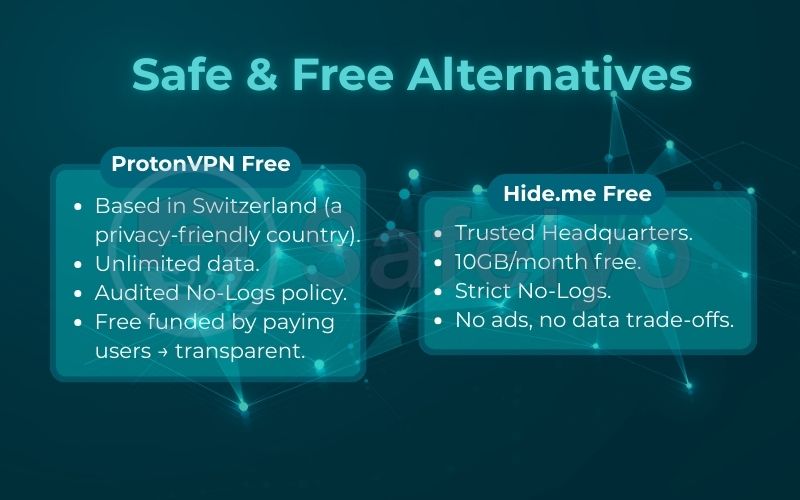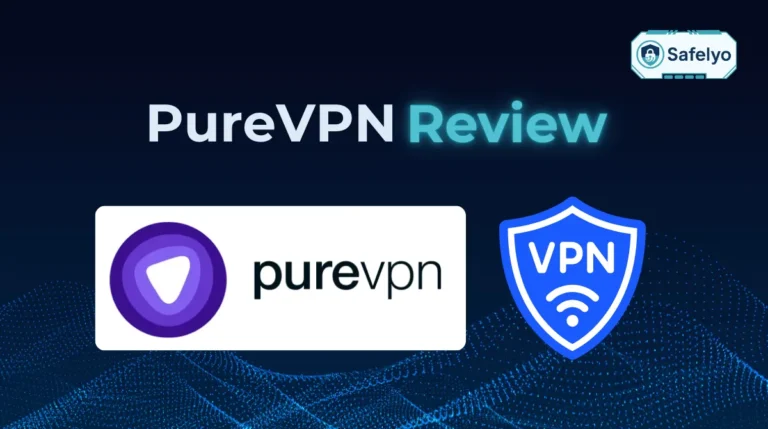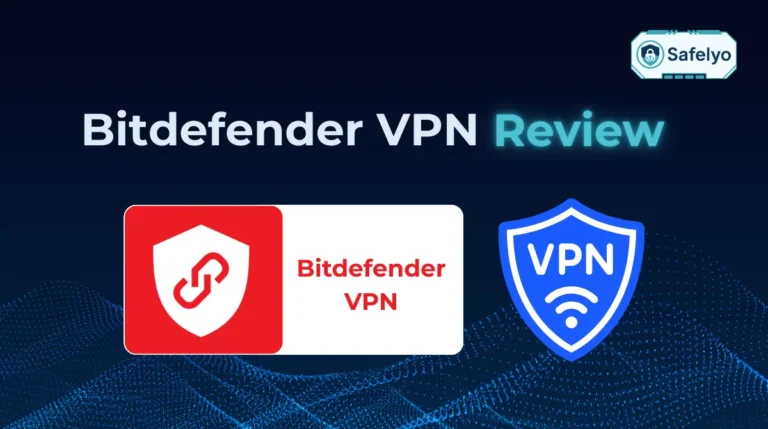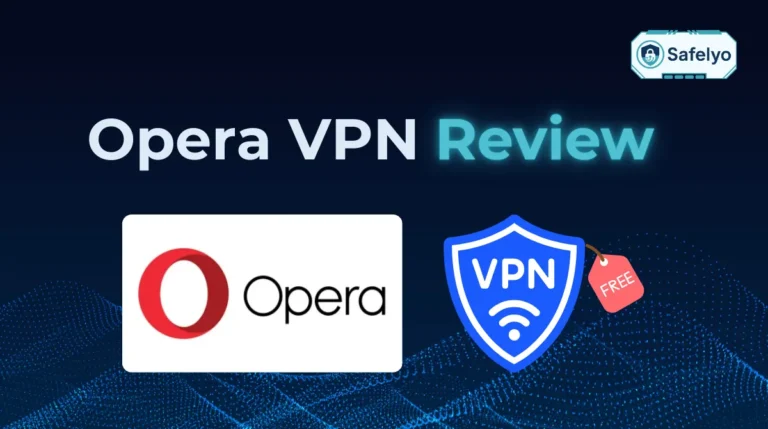This Betternet VPN review is not a typical analysis of features and speeds. Consider it a critical security warning for anyone tempted by its promise of a “free” VPN service. Don’t let the friendly name fool you; this service has a documented history that poses a significant threat to your online privacy.
With years of hands-on experience in cybersecurity, I’ve learned that the most dangerous products are often those that promise the most for nothing in return. Betternet is a classic example. While it advertises a “better internet,” the reality is a business model built on invasive data collection and a troubling track record of security flaws.
In this investigation, we will uncover:
- Betternet’s connection to its parent company, Aura, and the privacy controversies surrounding its sister service, Hotspot Shield.
- The alarming evidence from past academic studies flagged its app for malware.
- The exact methods this “free” VPN uses to make money at your expense.
This guide is designed to give you the unvarnished truth. Let me explain why Betternet is anything but better for your security.
VPN Score:
1.5 / 10
A dangerous free VPN that logs your data
Betternet VPN Feature Table
| Feature | Details |
| “Free” VPN Access | Provides a plan with unlimited bandwidth at no cost. However, this is supported by disruptive ads and invasive data collection, making the “free” price a direct trade for your privacy. |
| Catapult Hydra Protocol | Uses the proprietary Catapult Hydra protocol developed by its sister company, Hotspot Shield. While the protocol is designed for speed, the overall service is severely undermined by the company’s logging policies and slow server infrastructure. |
| Basic Security Features | Includes standard features like a Kill Switch and split tunneling (on some platforms). These are basic requirements for any VPN and do not compensate for the fundamental flaws in its privacy policy and business model. |
| Cross-Platform Apps | Offers simple, easy-to-install apps for major platforms like Windows, macOS, Android, and iOS. The simplicity of the apps masks the complex and dangerous data collection happening in the background. |
BEST FOR:
Betternet VPN is marketed towards users looking for a completely free and simple VPN solution who may not be aware of the underlying risks.
However, based on our in-depth analysis of its invasive data logging, documented history of malware, and alarmingly slow performance, Safelyo concludes that Betternet is not safe or suitable for any purpose. It represents a significant risk to user privacy and fails to deliver on the core promise of a VPN. For genuine security, this service should be avoided entirely by all users.
1. The final verdict: Do not install Betternet VPN
After years of testing and analyzing hundreds of security tools, some recommendations require careful nuance. This is not one of them. My conclusion is direct and unambiguous: do not install Betternet VPN under any circumstances.
If a product that’s supposed to protect you is fundamentally built to do the opposite, it’s not just a bad product – it’s a trap. From my experience, Betternet is one of the most glaring examples of this deceptive model I’ve ever reviewed.
To put it plainly, here is our official verdict and the key reasons why this service is a critical risk.
SAFELYO SECURITY WARNING: CRITICALLY UNSAFE
Overall Rating: 1.5 / 10
Betternet is a privacy nightmare disguised as a free VPN. Its business model relies on harvesting your data, its applications have a documented history of being flagged for malware, and its corporate structure lacks transparency.
Key risks include:
- Invasive data logging for advertising purposes.
- A documented history of malware and tracking libraries.
- Ownership by Aura, a company with its own privacy controversies.
- A misleading “free” model that compromises your security.
We urge you to uninstall it immediately if you have it installed and choose a safe alternative.
2. Follow the money: How Betternet really makes a profit
In my years analyzing cybersecurity products, I’ve learned a fundamental truth: if a security service is free, you aren’t the customer – you are the product. This has never been truer than with Betternet. The entire operation is designed to monetize its free users in ways that directly contradict the principles of privacy.
So, how does Betternet make money? It’s not magic. It’s a three-pronged strategy that leverages your activity and frustration.
Intrusive advertising
The first and most obvious method is aggressive advertising. When I tested the free app, my browsing sessions were constantly interrupted by full-screen video ads and pop-ups. It’s not just a minor annoyance; it’s incredibly disruptive. Imagine trying to have a private conversation while a salesperson repeatedly shouts commercials in your face. That’s the Betternet free experience. This alone makes the service barely usable, but it’s just the tip of the iceberg.
Data collection for "market research"
This is the hidden cost. Betternet’s privacy policy admits to collecting “anonymized” data, which includes information like the websites you visit, your approximate location, and details about your device. They state this data is used for commercial purposes and shared with third-party partners, including their parent company, Aura.
Let’s be clear: A trustworthy VPN should never have access to the websites you visit. While they label the data “anonymized,” collecting enough of these “anonymous” data points can create a detailed profile of your habits, which is a goldmine for advertisers and data brokers.
Upselling to a flawed premium plan
Finally, the terrible free experience is intentional. The slow speeds, constant ads, and limited functionality are all designed for one purpose: To frustrate you into upgrading to their paid “Premium” plan. It’s a classic bait-and-switch. They make the free version almost unbearable to make the paid version seem like a reasonable escape. However, the premium plan still operates under the same questionable company and privacy policy, meaning you’re paying for a service from a provider with a proven history of prioritizing profit over privacy.

3. The evidence file: Betternet’s troubled history
Bold claims require strong evidence, and in my analysis of Betternet, the historical record is undeniable. This isn’t based on rumor or opinion – it’s based on academic research and documented complaints against its parent company. These aren’t just mistakes from the past – they are foundational cracks in the company’s trustworthiness.
3.1. The CSIRO study: Malware and tracking libraries
One of the most damning pieces of evidence comes from a comprehensive 2017 study by Australia’s Commonwealth Scientific and Industrial Research Organisation (CSIRO). In their analysis of 283 VPN apps, the findings on Betternet were alarming.
The CSIRO Betternet study found that its Android app had one of the highest malware infection rates among all VPNs tested. Even more concerning, the app was embedded with 14 different tracking libraries – more than almost any other “free” VPN in the study.
This wasn’t an accident – it was a core part of its design. The purpose of these libraries was to monitor user activity and serve targeted ads, fundamentally compromising the very privacy a VPN is supposed to provide.
To put this in perspective, having 14 tracking libraries in a VPN app is like hiring a security guard who secretly brings 14 different spies into your house. Each spy follows you around, notes down what you do, and reports back to their own agency. It completely defeats the purpose of having a security guard in the first place.
3.2. The aura/hotspot shield connection: A pattern of behavior
The problem extends beyond Betternet itself and into its corporate family. Betternet is owned by Aura, the same company that owns Hotspot Shield, another well-known VPN with its own controversial history.
In 2017, the Center for Democracy & Technology (CDT) filed a formal complaint against Hotspot Shield, alleging that the service was violating its own “anonymous browsing” promises by intercepting and redirecting traffic to partner websites, including advertising companies.
From my professional standpoint, this reveals a corporate pattern of prioritizing profit over user privacy. When you see similar questionable practices across sister companies, it’s no longer an isolated incident. This connection between Aura, Betternet, and Hotspot Shield suggests a shared business philosophy that is incompatible with genuine user security.
As the saying goes, the apple doesn’t fall far from the tree. In this case, Betternet isn’t an isolated bad apple – it’s part of an orchard with a history of questionable practices.
4. Betternet’s privacy policy: What they admit to logging
As a security analyst, I’ve learned that a VPN’s privacy policy is its most important feature. Some are refreshingly transparent, while others, like Betternet’s, are deliberately vague to give them leeway to collect your data.
While they use phrases like “no-logging,” the details in the Betternet logging policy tell a different story. To make the contrast crystal clear, let’s compare what Betternet collects versus what a truly trustworthy, zero-logs VPN provider does.
The difference isn’t just technical – it’s a fundamental disagreement on what “privacy” means.
| Feature Comparison | Betternet VPN | A Trustworthy Zero-Logs VPN |
| Activity Logging | Collects aggregated data on websites you visit. They claim it’s “anonymized,” but this is a serious privacy risk. | Strictly no activity logs. They do not know or record which websites you visit, ever. |
| IP Address Logging | Collects your approximate geographic location derived from your IP address. | Does not log your original IP address. This is a core principle of a no-logs policy. |
| Device Information | Collects details about your device, like OS and hardware identifiers, which can be used for fingerprinting. | Collects absolutely no device-specific identifiers. Your device remains anonymous. |
| Primary Purpose of Data | For commercial purposes, “market research” and sharing with third-party partners (like its parent company, Aura). | Solely for service maintenance (e.g., server load management) and nothing more. The data is never personal. |
| Business Model | You are the product. Your data is harvested and monetized to support the “free” service and for other commercial gains. | You are the customer. The service is funded by user subscriptions, aligning their business goals with your privacy. |
As you can see, the Betternet privacy approach is fundamentally flawed. They collect a treasure trove of data not to run the service, but for their own commercial benefit. Their policy isn’t a promise of privacy – it’s a disclosure of their data harvesting operation.
5. Performance test: Adding slow speeds to security risks
Even if we were to ignore the glaring security and privacy risks for a moment – which you absolutely should not – the question remains: Does Betternet even perform well as a VPN?
To find out, I ran a series of speed tests from my location in the US. I first measured my baseline internet speed without any VPN connected. Then, I connected to several Betternet servers in different regions to measure the impact on performance.
The results were, frankly, abysmal. Here’s a summary of my findings:
| Server Location | My Baseline Speed (Download/Upload) | Speeda with Betternet (Download/Upload) | Speed Loss |
|---|---|---|---|
| No VPN | 300 Mbps / 100 Mbps | N/A | N/A |
| US Server (East Coast) | 300 Mbps / 100 Mbps | 45 Mbps / 15 Mbps | 85% Loss |
| UK Server | 300 Mbps / 100 Mbps | 28 Mbps / 8 Mbps | 91% Loss |
| Japan Server | 300 Mbps / 100 Mbps | 19 Mbps / 5 Mbps | 94% Loss |
Note: Speed tests can vary based on your location, time of day, and network conditions. However, these results reflect a consistent and significant performance drop during my testing.
A speed loss of over 85% is simply unacceptable for any modern VPN. To put this into context:
- Streaming: At these speeds, I struggled to watch a YouTube video in 1080p without constant buffering. Streaming Netflix in 4K would be impossible.
- Gaming: The high latency and slow speeds make online gaming a frustrating, lag-filled experience.
- General Browsing: Even simple web pages loaded noticeably slower.
So, on top of all the privacy risks, Betternet is also incredibly slow. It’s the worst of both worlds. You are sacrificing your personal data and your internet performance for a “free” service that fails at its most basic function. It’s like hiring that spy-infested security guard from earlier, only to find out he’s also asleep on the job.
6. Safe and truly free alternatives to Betternet
After all this bad news, I want to leave you with a safe path forward. The appeal of a “free” VPN is understandable, but you should never have to trade your privacy for it. The good news is, you don’t have to. There are a few reputable companies that offer free plans as a gateway to their premium services, built on trust, not data exploitation.
Based on my extensive testing and analysis, if you’re looking for a Betternet alternative that actually protects you, these are the services that get free” right.
6.1. Best free VPNs that respect your privacy
Proton VPN Free
This is my top recommendation for a free VPN. It offers truly unlimited data on its free plan, which is extremely rare. Its business model is transparent: The free service is supported by its paying users. Based in privacy-friendly Switzerland, Proton VPN has a strict, audited no-logs policy that you can actually trust.
>> To see how it performs in our tests, read our full Proton VPN review.
Hide.me Free
Another excellent and trustworthy provider. Hide.me offers a generous 10GB of data per month on its free plan, which is more than enough for secure browsing and messaging. They have a proven, strict no-logs policy and don’t force you to watch ads or compromise your security in any way. Their limitations are clear and honest.
>> For a closer look at its features, check out our complete Hide.me review.
6.2. Why these free VPNs are safer
The difference between these services and Betternet comes down to one thing: Their business model.
Think of it this way: Betternet is like a restaurant offering a “free buffet” but makes its money by secretly selling your dinner conversation to marketers. It’s a deceptive trade. Proton VPN and Hide.me are like restaurants that offer a free, limited tasting menu. They give you a genuine, high-quality sample of their service, hoping you’ll enjoy it enough to one day pay for the full dining experience. Their goal is to earn your trust, not exploit it.
These providers are safer because:
- They don’t sell your data. Their income comes from paying subscribers, not data brokers.
- Their reputation is their most valuable asset. A single privacy scandal could destroy their entire business, so they have every incentive to protect you.
Choosing one of these providers isn’t just a better alternative – it’s the only sensible choice if you need a free VPN.

7. FAQ about Betternet VPN
Here are quick, direct answers to the most common questions I hear about Betternet. My goal is to clear up any lingering confusion you might have.
Is Betternet a legit VPN?
Yes, Betternet is a legitimate company in the sense that it’s a real business that provides a VPN service. However, “legit” does not mean “safe” or “trustworthy.” Its business practices, including its invasive data logging and history of malware, make it a completely unsafe choice for anyone concerned about privacy.
Does Betternet VPN sell data?
While their policy doesn’t explicitly use the word “sell,” it admits to collecting user data and sharing it with third-party partners for commercial purposes. In the world of data privacy, this is functionally the same as selling data. They are monetizing your activity, which is the opposite of what a secure VPN should do.
Is Betternet Premium safe?
No. The premium version is not safe. While it removes the ads, it still operates under the same invasive privacy policy and the same parent company, Aura. You are paying for a service from a company with a documented history of prioritizing profit over user privacy. The fundamental trust issue remains.
Does Betternet VPN work with Netflix?
In my tests, Betternet was highly unreliable for streaming and failed to unblock Netflix and other major platforms. Even if you get it to work intermittently, the extremely slow speeds I recorded would lead to constant buffering and a frustrating viewing experience.
Has Betternet removed the malware from its app?
While they have likely updated their app since the 2017 CSIRO study, the core issue isn’t a specific piece of old code. The real problem is the business model and company culture that allowed malware and 14 tracking libraries to be included in the first place. That data-hungry business model has not changed, making the service inherently untrustworthy.
What is the worst thing about Betternet?
Without a doubt, the worst thing about Betternet is its deceptive nature. It uses a friendly, positive name (“Betternet”) and the powerful lure of “free” to attract users into a system designed to harvest their data. It completely betrays the core purpose of a VPN, which is to protect privacy, not exploit it.
What is the Betternet VPN review 2025?
My 2025 review concludes that Betternet is a significant privacy risk. Looking ahead, unless the company undertakes a radical transformation – including a complete overhaul of its business model, a strict, independently audited no-logs policy, and a commitment to transparency – my verdict for 2025 will almost certainly remain the same: avoid this service at all costs.
Which VPN is most trusted?
The most trusted VPNs are those with a long-standing public reputation for transparency, independently audited no-logs policies, and headquarters in privacy-friendly countries. Services like Proton VPN and NordVPN are consistently ranked as highly trustworthy. For a full comparison, our guide to the most secure VPNs is the best place to start.
8. Conclusion
Our Betternet VPN review leaves no room for doubt: this service is not just a poor-performing tool but a genuine threat to your digital privacy. Its entire operation is built on a foundation that contradicts the very idea of security.
To summarize, you must avoid Betternet because of its:
- Documented history of being flagged for malware and embedded with numerous tracking libraries.
- Invasive logging policy that admits to collecting website data for commercial purposes.
- Questionable corporate ownership by Aura, a company with its own history of privacy complaints.
- Extremely slow speeds that make the service unusable for streaming, gaming, or even heavy browsing.
- Deceptive “free” model designed to monetize your data and frustration.
The name itself is a paradox. For a better internet and far better security, your first step should be to avoid Betternet entirely. Here at Safelyo, we believe your privacy is non-negotiable. Don’t settle for a VPN that compromises you. Explore Safelyo’s VPN reviews category, where our evaluations for 2025 are built on a foundation of proven trust, security, and performance.












